Noonday Collection’s Jessica Honegger is making the world a better place, one accessory at a time.
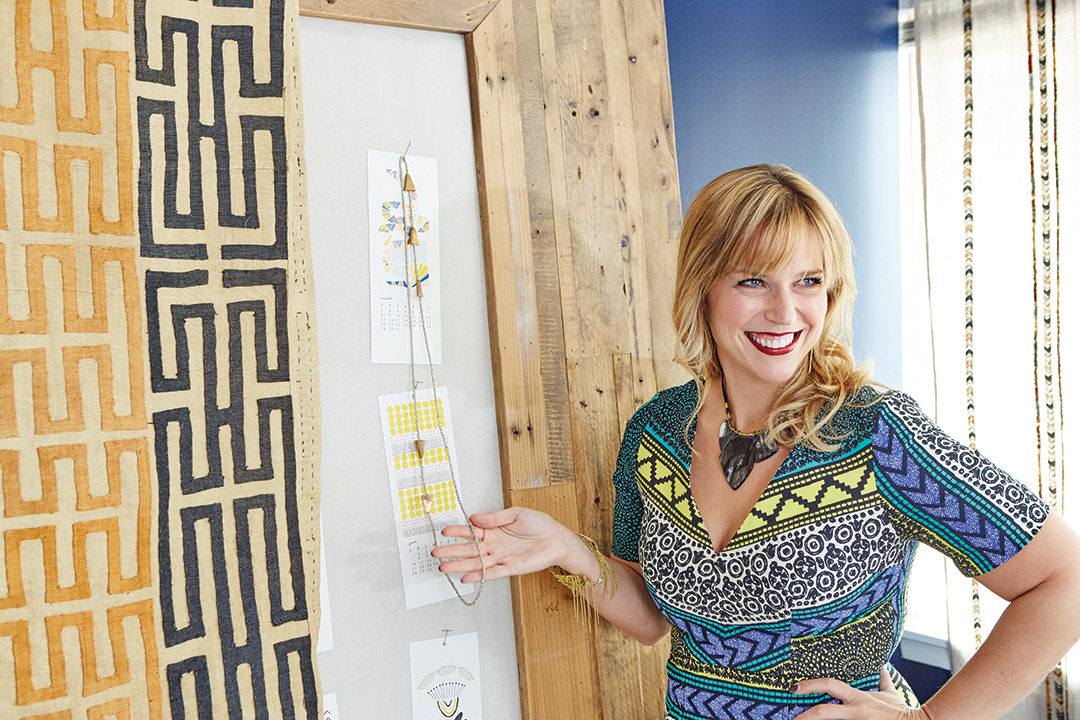 In a city overflowing with eyes-on-the-prize entrepreneurs focused on the next big idea and even bigger profit ratio, Jessica Honegger is doing much more than simply making her mark as a financial success story. She’s changing the world, one accessory at a time. As the founder and co-CEO of Noonday Collection, the phenomenally successful Austin-based fashion-accessory company, the busy executive fashionista is in constant commute mode, usually in transit to some remote part of the world—Africa, China, Southeast Asia, South America—recruiting, nurturing and overseeing her ever-expanding army of artisans and suppliers. She probably spends more time at Austin Bergstrom International Airport than at her home on Austin’s Eastside.
In a city overflowing with eyes-on-the-prize entrepreneurs focused on the next big idea and even bigger profit ratio, Jessica Honegger is doing much more than simply making her mark as a financial success story. She’s changing the world, one accessory at a time. As the founder and co-CEO of Noonday Collection, the phenomenally successful Austin-based fashion-accessory company, the busy executive fashionista is in constant commute mode, usually in transit to some remote part of the world—Africa, China, Southeast Asia, South America—recruiting, nurturing and overseeing her ever-expanding army of artisans and suppliers. She probably spends more time at Austin Bergstrom International Airport than at her home on Austin’s Eastside.
On this balmy fall day, she’s briefly touching down at her corporate headquarters to oversee a fashion shoot. Just back from a trip to Africa, she’s leaving town again first thing the next morning. If she has jet lag, she doesn’t show it.
“I’m going to Nashville tomorrow. We’re raising adoption money for seven families,” she says, her face breaking into a huge smile of anticipation. “It’s going to be big!”
As the adoptive parent of a child from Rwanda herself, Honegger is passionate about adopting children from overseas. She is passionate about a lot of things: empowering women, fashion, fair trade, trunk shows, children, kombucha and, biggest of all, connection. Connection is a recurring motif in Honegger’s life; it’s in her spiritual DNA.
“I love connecting with women and people and cultures, and celebrating that we’re more alike than we are different,” she says. “I enjoy creating opportunities for women here in America and in other countries to come into their own and walk past fear and perfectionism, and embrace who they are in the world. To be able to connect with these artisans and entrepreneurs that are going through similar journeys is definitely my joy.”
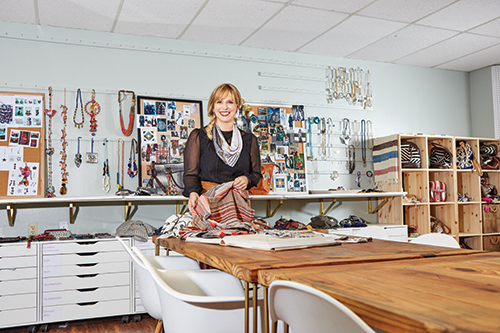 To say her energy and efforts have paid off is an understatement. In just five years, Noonday Collection has grown into one of the hottest new companies in the country, boasting more than $11 million in revenue last year, and a three-year growth rate of more than 5,000 percent. The company was spotlighted in Inc. Magazine as third on the list of Fastest Rising Women-Led Businesses in the Country, and last October, Noonday nailed the No. 1 spot on Austin Business Journal’s Fast 50 rankings for businesses with revenue of more than $10 million. What began with a single improvised trunk show in her living room now has more than 60 full-time office employees working out of an impressive office-cum-warehouse in East Austin, along with nearly 1,000 independent sellers throughout the country showing and selling the work of more than 4,000 artisans from 14 countries.
To say her energy and efforts have paid off is an understatement. In just five years, Noonday Collection has grown into one of the hottest new companies in the country, boasting more than $11 million in revenue last year, and a three-year growth rate of more than 5,000 percent. The company was spotlighted in Inc. Magazine as third on the list of Fastest Rising Women-Led Businesses in the Country, and last October, Noonday nailed the No. 1 spot on Austin Business Journal’s Fast 50 rankings for businesses with revenue of more than $10 million. What began with a single improvised trunk show in her living room now has more than 60 full-time office employees working out of an impressive office-cum-warehouse in East Austin, along with nearly 1,000 independent sellers throughout the country showing and selling the work of more than 4,000 artisans from 14 countries.
With that degree of success, you may expect Honegger’s hauteur to border on Prada-esque. But despite her formidable achievements, success hasn’t gone to her head. Ebullient and down-to-earth, she exudes an aura of relentless optimism, resolve and boundless energy. She seems to run on pure passion, faith and, in moments of indulgence, Starbucks coffee. Honegger wears the accoutrements of her success casually and comfortably, embracing a refreshing worldview on what defines a successful woman.
“We’re an image-driven culture,” she observes. “We have these images of perfectionism and what we should be as women. When I think about what the perfect fashion-company CEO should be, I think of Gwyneth Paltrow,” she says, breaking out into a self-deprecating laugh. “And when I compare myself to Gwyn, I fall short.
“But as I travel, I’m able to see what other women are doing in the world, and they definitely don’t have the same definition of success as women here in America. For them as working mothers, they’re doing everything they can so their children can flourish. The more I became part of this global community of women, the more I saw how I was the one who had a wrong perception of being a working mom in the world.”
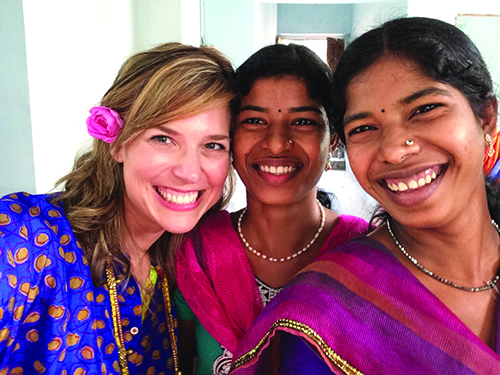 When she’s not scouting out new fashion-accessory merchandise throughout the world, Honegger is often seen at trunk shows in this country, those hosted by her ever-expanding brigade of Noonday Collection sales reps, called ambassadors in the company lingo, or speaking at endless seminars and events, often for overseas adoption fundraisers. Noonday’s unique business modus operandi is modeled after the popular Tupperware parties of the 1950s and 1960s, in which neighborhood distributors sponsored informal selling soirees out of their homes. But Noonday’s tweak on the formula is revolutionary. Instead of cookware, Noonday Collection ambassadors showcase handmade fashion accessories by artisans from throughout the world, and both the artisans and sellers make a profit. All Noonday’s products—colorful scarves, elegant bracelets, necklaces, earrings, bags, purses and more—are handmade by local artisans from throughout the world, and all transactions strictly adhere to Fair Trade Federation guidelines. Artisans rely on ambassadors in the States to sell their products, and ambassadors rely on the artisans overseas to provide them. It’s a symbiotic partnership spanning the globe and connecting cultures. Call it compassionate capitalism.
When she’s not scouting out new fashion-accessory merchandise throughout the world, Honegger is often seen at trunk shows in this country, those hosted by her ever-expanding brigade of Noonday Collection sales reps, called ambassadors in the company lingo, or speaking at endless seminars and events, often for overseas adoption fundraisers. Noonday’s unique business modus operandi is modeled after the popular Tupperware parties of the 1950s and 1960s, in which neighborhood distributors sponsored informal selling soirees out of their homes. But Noonday’s tweak on the formula is revolutionary. Instead of cookware, Noonday Collection ambassadors showcase handmade fashion accessories by artisans from throughout the world, and both the artisans and sellers make a profit. All Noonday’s products—colorful scarves, elegant bracelets, necklaces, earrings, bags, purses and more—are handmade by local artisans from throughout the world, and all transactions strictly adhere to Fair Trade Federation guidelines. Artisans rely on ambassadors in the States to sell their products, and ambassadors rely on the artisans overseas to provide them. It’s a symbiotic partnership spanning the globe and connecting cultures. Call it compassionate capitalism.
Jessica Honegger’s globe-spanning spiritual journey began less than 100 miles from her current home in Austin. Honegger was raised in San Antonio as the younger of two children. Her mother was a stay-at-home mom and her father was an entrepreneur, working in the less-than-glamorous field of water-waste management and grease traps.
“I grew up visiting sewage-treatment plants on the weekends,” she smiles. “Very sexy job.”
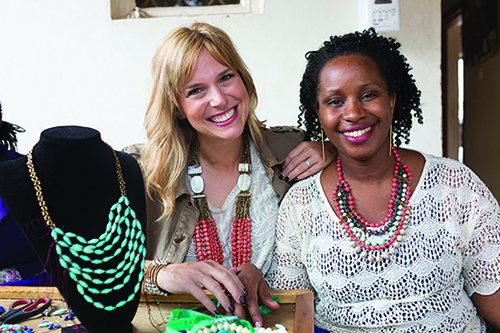 During a summer while in high school, she journeyed to Kenya with a church outreach group to help construct a building for a community sewing circle, a harbinger of things to come.
During a summer while in high school, she journeyed to Kenya with a church outreach group to help construct a building for a community sewing circle, a harbinger of things to come.
“It was the first time I saw poverty outside of my own country,” she recalls. “I remember seeing a 4-year-old girl carrying her younger brother on her back. There were a lot of children without parents.”
Returning home, Honegger resolved to make a difference, launching a local campaign to raise funds to send a girl she met in Kenya to school.
“I kind of became the resident activist at high school,” she says with a laugh.
After graduating from the University of Texas with a degree in Latin American studies, Honegger volunteered for the international outreach group Food for the Hungry, going to Bolivia for a year, a pivotal moment in her entrepreneurial evolution. While in training, Honegger met her future husband, Joe, who was assigned to Guatemala. The two shared a mutual desire to make a difference in the lives of those less fortunate.
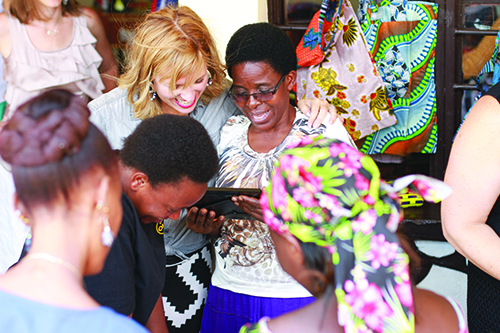 During her time with Food for the Hungry, Honegger came to realize the correlation between work and self-esteem.
During her time with Food for the Hungry, Honegger came to realize the correlation between work and self-esteem.
“I saw the power of how work restores dignity, learning more about community development,” she says. “I saw rising out of poverty was largely due to an entrepreneurial spirit, where they took what little they had and multiplied that. Even if it was something like starting a little business, selling coal to their neighbors. I began to notice how entrepreneurship could play a part in creating opportunity for the poor, and that work is a way to restore human dignity to people. That’s something I really wanted to be part of.”
Honegger returned to the U.S. a year later, marrying Joe and moving to Austin in 2002, but found her homecoming a disorienting transition. During the next few years, she bounced through a seemingly random series of unfulfilling jobs: flipping houses, working in a jewelry store, trying her hand at interior design. The couple also had two children: Amelie, now 9, and Holden, 7. Still, something was missing.
“I really struggled when we moved back to Austin, and felt a disconnect between this American life and the simplicity of the life I had lived overseas,” she confesses.
Honegger had also felt a profound calling to adopt a child from overseas. When she and her husband visited an orphanage in Uganda during a trip in 2010, the die was cast. They resolved to adopt a child from Rwanda, an expensive and time-consuming process. During that same trip, Honegger also connected with Jalia and Daniel, two struggling paper-bead-necklace designers from Uganda who had a backlog of product stored away in the States. They asked Honegger to try to sell some of their bead necklaces in the United States when she returned home. Impressed with both their work and their commitment to helping other artisans in their community, she agreed.
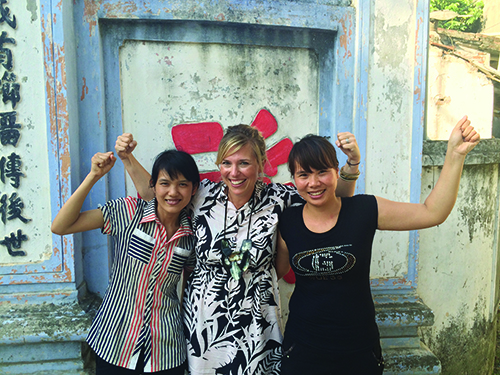 That February, determined to raise money for the adoption, the fledgling entrepreneur took a leap of faith.
That February, determined to raise money for the adoption, the fledgling entrepreneur took a leap of faith.
“I had my first trunk show at our home, selling Jalia’s stuff. I also sold anything else I had, my clothes, my furniture. It was like a garage sale,” she says.
But, by far, the hottest seller was Jalia’s jewelry. Suddenly, kismet kicked in. All the acquired skill sets Honegger had previously perceived as random failures began to coalesce into building tools for a unique business. She realized she could seek out the best artisans overseas in vulnerable communities, pay them a fair wage for their wares and sell them in the states, with her profits going toward adoption funds. She christened the company Noonday, after a Bible verse derived from Isaiah 58:10, “When you offer yourself to the hungry and afflicted, then your light will rise in the darkness and become like the noonday.” The passage appealed to her.
“This idea of noonday—the sun, of something really positive and how women shine when they come together—it seemed right,” she says.
J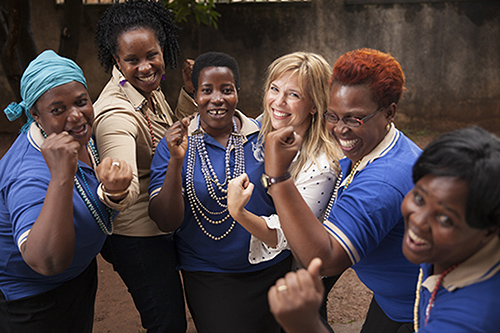 alia and Daniel became Noonday’s first artisans. Honegger also found a financing partner for Noonday, Travis Wilson, a friend and investor who believed in her vision. The cherry on top came the next year, when the Honeggers welcomed their newly adopted son from Rwanda, Jack, into the family. Since then, several Noonday employees and ambassadors have adopted children from overseas.
alia and Daniel became Noonday’s first artisans. Honegger also found a financing partner for Noonday, Travis Wilson, a friend and investor who believed in her vision. The cherry on top came the next year, when the Honeggers welcomed their newly adopted son from Rwanda, Jack, into the family. Since then, several Noonday employees and ambassadors have adopted children from overseas.
But Noonday was not an overnight success.
“It was a rudimentary business,” Honegger recalls of the early days, “but pretty quickly, I pulled to work elements together: product, branding, customers. I was a company of one.”
When a friend in Seattle heard about Honegger’s fundraising trunk show, she asked if she could have one, eventually becoming Noonday’s first ambassador. Via several conduits—Noonday’s catalogue, website, trunk shows and growing word-of-mouth reputation—the company’s workforce and customer base expanded exponentially.
As Noonday’s momentum grew, Honegger grew increasingly self-confident, becoming a virtuoso in the fine art of persuasion and motivational speaking.
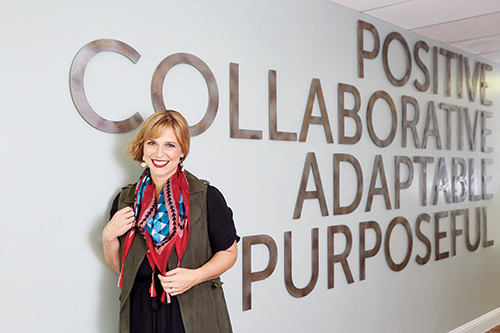 “You hate saying no to her,” says Laura Choy, a longtime Noonday independent ambassador, “because you sense that if you say yes to whatever new idea she has up her sleeve, you’re going to be part of something really special.”
“You hate saying no to her,” says Laura Choy, a longtime Noonday independent ambassador, “because you sense that if you say yes to whatever new idea she has up her sleeve, you’re going to be part of something really special.”
Honegger is a big booster for self-empowerment.
“I think power is a gift, and the ultimate test of power is when we’re using it to create more power for others,” she says. “I feel that, as women, we don’t need to diminish one another. We don’t need to compete. We can actually create opportunity and use our power to create more power for one another. That really is the premise of Noonday Collection.”
Noonday’s mission and business model empower not only women in far-off places, but within the company as well.
“I’ve learned that there’s power in my voice,” Choy says. “I’ve always been quiet and reticent to believe that what I say matters. I think customers might feel the same, like their purchase is good, but still just kind of small. I disagree. They actually provide work for me, and we all get to provide better for our families.”
Fellow ambassador Heather Bauer echoes Choy’s sentiments.
“I’ve met mamas from Ethiopia to Ecuador and right here locally in Austin who all want the same thing,” she says. “We want good jobs, a good education for our kids, a safe place to raise a family. I’ve learned that no matter where you live or what sort of economic status you were born into or have built for yourself, we are all connected.”
Once again, it comes back to that theme of connection.
“When I think about that first gathering I had at my home, it wasn’t just about selling things to make money toward adoption. It was really about mobilizing my community to understand the journey we were about to go through. A physical gathering is such a powerful way to do that. We’re such a digital culture now. To actually have a physical gathering where we can come together and celebrate this journey that adoption takes us on is really powerful.”
Recently, Honegger and 60 Noonday ambassadors completed a group trip to various countries, meeting many of the artisans they’ve come to know through telling their stories and selling their wares at trunk shows. Gathered in sewing circles, around weaving looms and at shared meals, the connection between women and cultures was immediate and lasting. Language and economic barriers evaporated in a communal quilt of shared purpose.
With Noonday’s success, Jessica Honegger has effectively become an artisan of sorts herself, creating a business model with universal appeal, sustainability and purpose. Now that’s a fashion statement for the ages.
For more information, visit noondaycollection.com.
JESSICA HONEGGER’S FAVORITES FROM NOONDAY COLLECTION
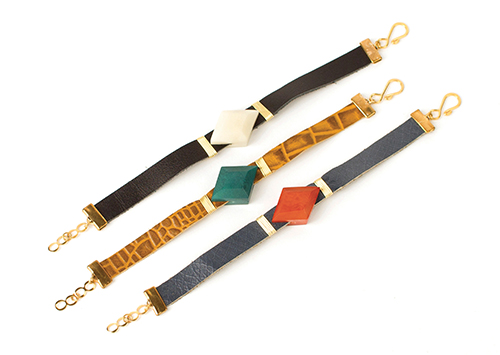
Ecuador Bracelets
“Each season, our design team whips up a new set of dreamy arm candy. I love these tagua seed and leather beauties from Ecuador. With one in each of my favorite fall shades, they make a perfect autumn ensemble.”
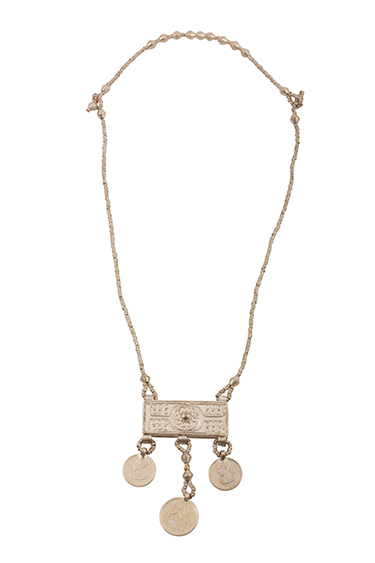
Ibrahim Necklace
“Our Ibrahim necklace from Ethiopia is a definite favorite of mine. I love the versatility of this piece too. The top features a removable bracelet, so it pairs as a longer necklace or bracelet, or both.”
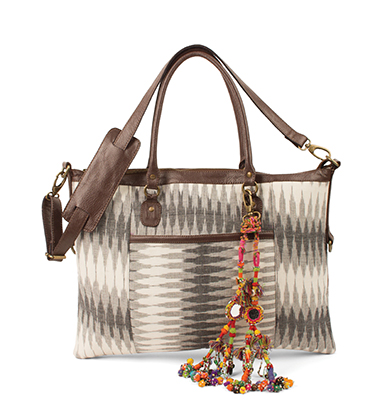 Westward Bag
Westward Bag
“Of-the-moment ikat combined with vintage Indian fabrics makes this piece a must-have in my book. It reminds me of exploring the markets in India.”
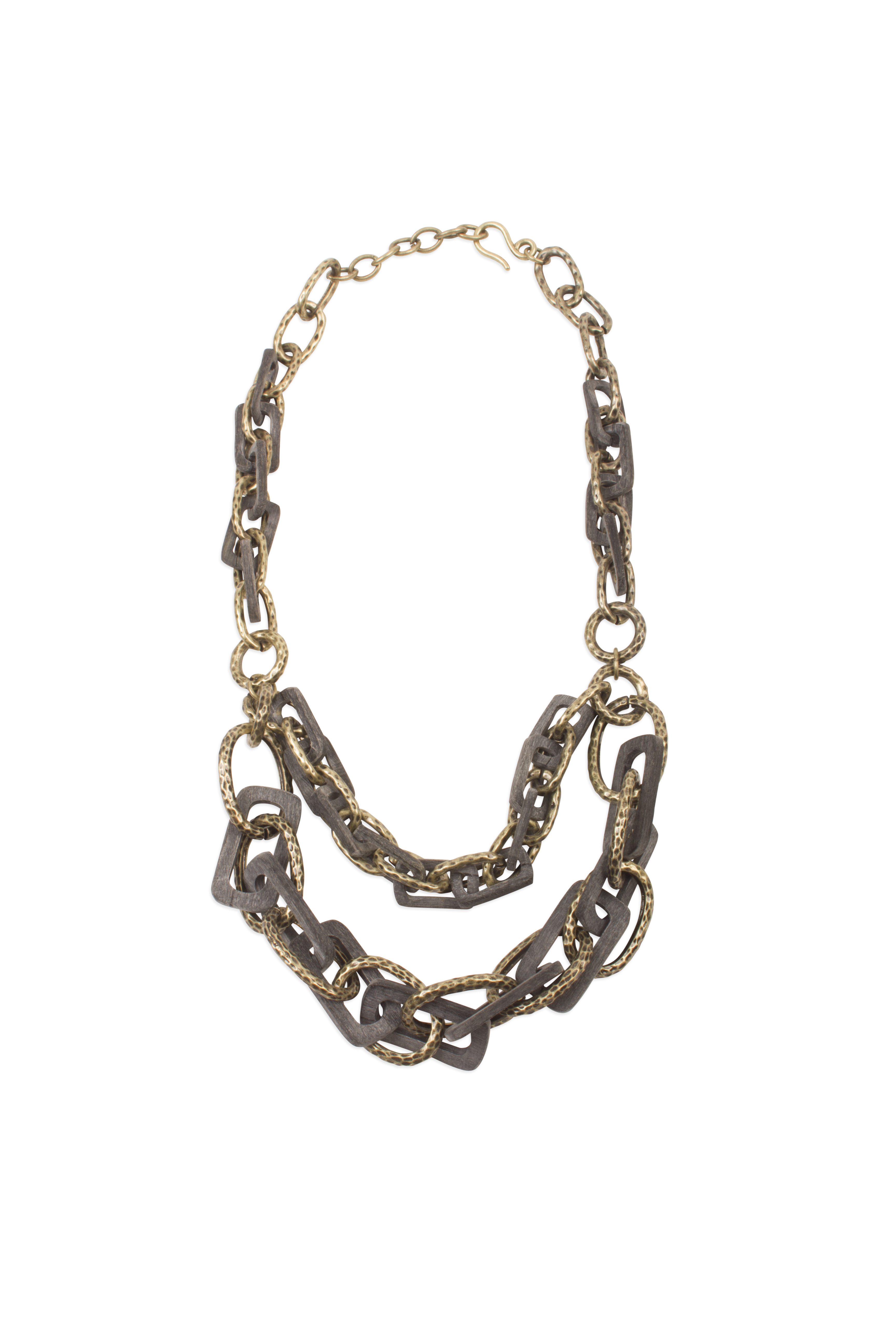
Linked Horn Necklace
“The mix of raw and refined come together so perfectly in this necklace. This piece is made by Vietnamese artisans who carve jewelry from ethically harvested water-buffalo horn, continuing a craft their village has practiced for 400 years.”
2015 NOONDAY COLLECTION NOONDAY COLLECTION BY THE NUMBERS
Partners with 30 artisan businesses
Directly impacts 4,047 artisans in 12 countries
Noonday’s global impact reaches 19,731 family members
Together, the Noonday family has celebrated and supported 1,621 adoptive families.
ANA HERNANDEZ
 Ana Nineth Hernandez’s English may be a little hesitant, but even over a fuzzy and freeze-prone Skype call from Guatemala, her smile comes across bright and clear. Five years ago, Hernandez was living a fringe existence, weaving scarves and selling them to occasional tourists from her modest textile business in her small village of San Juan La Laguna. Today, she oversees a profitable weaving business with 35 employees, making scarves to be sold in the U.S. for Noonday Collection.
Ana Nineth Hernandez’s English may be a little hesitant, but even over a fuzzy and freeze-prone Skype call from Guatemala, her smile comes across bright and clear. Five years ago, Hernandez was living a fringe existence, weaving scarves and selling them to occasional tourists from her modest textile business in her small village of San Juan La Laguna. Today, she oversees a profitable weaving business with 35 employees, making scarves to be sold in the U.S. for Noonday Collection.
“I like to create new things for Noonday,” she says. “It has definitely changed my life, given me opportunities such as further study at university, and support my family and other people financially.”
Hernandez and her group of employees, all women, generate more income than most of the men in her village, who typically make about $2 a day harvesting coffee.
“It’s very important to me,” she says haltingly. “I can create opportunities for me, but most important, to create opportunities for other women.”
Hernandez began weaving when she was 7, continuing a tradition that has been part of her family’s livelihood for generations.
Jessica Honegger met Hernandez during a visit to her village in 2012, and became intrigued with Hernandez’s unique method of utilizing local plants to produce dyes for the dazzling colored yarns used in weaving. The two women bonded instantly. Hernandez’s work is now a popular Noonday Collection perennial.
“I love her passion for work,” Hernandez says Honegger. “And she supports the change of lives of people around the world. I like to work with her for those reasons.”
Overseas photos courtesy of Noonday Collection.

